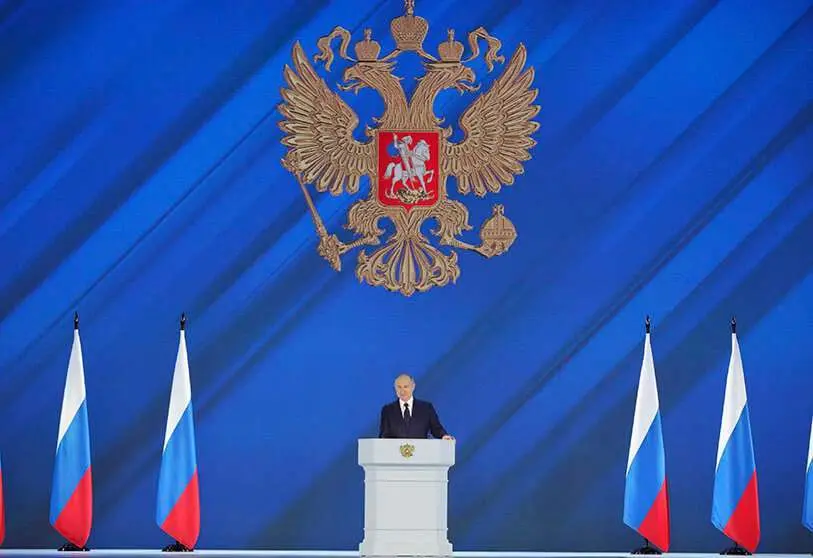Putin warns West will regret crossing "red lines" if it decides to cross them

Russian President Vladimir Putin today warned the West that he will regret any provocation and that the Kremlin will respond "asymmetrically, swiftly and harshly" if any country decides to cross "red lines".
"We do not want to burn bridges, but if someone perceives our good intentions as apathy or weakness and intends to burn those bridges, then they should know that Russia's response will be asymmetric, swift and tough," he said in his state of the nation address to the Federal Assembly.
"They will regret it as they have not regretted it for a long time," he warned.

In a speech that focused on the pandemic and the country's socio-economic situation, Putin avoided mentioning Russia's increased military presence on the Ukrainian border, which is of such concern to the West, nor did he allude to the deteriorating health of imprisoned opposition leader Alexei Navalny.
"There is no end to unfriendly acts against Russia. Attempts for any reason or even no reason at all to accuse Russia have become a kind of sport among some countries," he said.
"But I hope that no one will decide to cross the so-called red line in relations with Russia," Putin told ministers, deputies, senators and regional heads in the Manezh hall, where he made it clear that the Kremlin will decide in "each case" where Moscow's limit of patience lies.
Putin was also keen to underline what he saw as biased behaviour on the part of the West, which, he said, had not taken a position on the alleged "coup d'état" denounced by Minsk and Moscow last week, which included a plot to assassinate Belarus's authoritarian leader, Alexander Lukashenko.
"The practice of organising coups, the plans for political assassinations (...) this is already too much. They have gone beyond all limits," Putin said.

Putin did, however, reach out to the international community, inviting above all the five nuclear-weapon states - in addition to Russia, the US, the UK, France and China - to address the issue of global and strategic stability.
"Russia once again invites its partners to address issues related to strategic weapons and guarantees for global stability," he stressed, asserting that the proportion of modern weapons in Russia's so-called nuclear triad - strategic aviation, intercontinental missiles and missile-equipped nuclear submarines - will reach 88% this year.
Putin devoted most of his speech, however, to domestic issues, especially the state of the Russian economy and families in the wake of the pandemic and the vaccination campaign.
The leader, who has recently been vaccinated against the coronavirus, urged the Russian population to get vaccinated in order to achieve herd immunity in the autumn in the country of 146 million people.

"Vaccination is now of the utmost importance and I ask all the heads of the regions, the government, to work on this every day. And by autumn we must build up herd immunity," he said.
According to the GOGOV website, the only one that collects data on the vaccination process in all regions in the absence of official statistics, 10.6 million people or 7.24% of the population have been inoculated in Russia with the first dose and 6.3 million with the second dose (4.32%).
According to his estimates, at this rate half of the Russian population will only be vaccinated in 348 days, but Health Minister Mikhail Murashko said today that 60% of the population will be vaccinated by August.
Putin also called for boosting the birth rate in the face of a falling birth rate in order to reach a life expectancy of 78 years (currently 73.4 years) by 2030, and for ensuring the growth of citizens' real incomes and the fight against poverty.

Russia, which is in recession, closed the first quarter with a 1.3 % fall in GDP. Real incomes of Russians have risen by 2 % year-on-year in February, but the number of unemployed has increased by 16.4 % year-on-year in March.
Some 17.8 million Russians have incomes below subsistence level (11,653 roubles: $150 or 126 euros), or 12.1 per cent of the population, according to official data.
In this context, Putin promised support measures for Russians, including a payment of 5,650 roubles (74 dollars or 61 euros) from 1 July for children aged eight to 16 in single-parent families; a disbursement of 6,359 roubles (83 dollars or 64 euros) for pregnant women in a difficult financial situation; or 10,000 roubles (131 dollars or 108 euros) for families with school-age children.
According to Finance Minister Anton Siluanov, all the measures announced by Putin ahead of September's parliamentary elections will amount to a disbursement of 400 billion roubles over two years (5.2 billion dollars or 4.35 billion euros).








